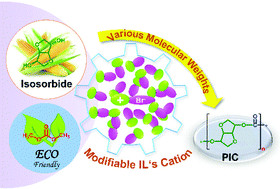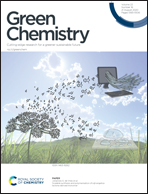Efficient synthesis of bio-derived polycarbonates from dimethyl carbonate and isosorbide: regulating exo-OH and endo-OH reactivity by ionic liquids†
Abstract
It is an immense challenge to design catalysts for synthesizing high molecular weight polycarbonates using CO2, CO2-based compounds, or biorenewable chemicals as building blocks. To this end, an eco-compatible approach to synthesizing polycarbonates from biorenewable isosorbide and CO2-derived dimethyl carbonate (DMC) has been exploited: the regulation of poly(isosorbide carbonate) molecular weight can be achieved by modifying the cation structure of ionic liquid (IL) catalysts. The hydrogen bond donating and accepting ability of ILs can be altered by adjusting the cation structure, which successfully leads to the tunability of the intrinsic imbalance reactivity of exo-OH and endo-OH in isosorbide. Moreover, these ILs exclusively activate the carbonyl carbon of DMC for accelerating the polymerization reaction. These features are appealing superiorities of ILs as compared to catalysts involving metallic elements. The [Emim]Br catalyst remarkably decreased the imbalanced reactivity of –OH groups of isosorbide, and exhibited the highest catalytic activity. With the presence of [Emim]Br, the poly(isosorbide carbonate) (PIC) weight-average molecular weight and glass transition temperature attained were 52 100 g mol−1 and 156 °C, respectively. Additionally, according to experimental results, DFT calculations, and in situ1H NMR analysis, a possible polymerization mechanism indicates that bromine-derived ILs participate in nucleophilic–electrophilic dual-activation in catalyzing PIC synthesis. Our work offers a direction to design catalysts for synthesizing PICs with higher molecular weights through an eco-compatible route.



 Please wait while we load your content...
Please wait while we load your content...